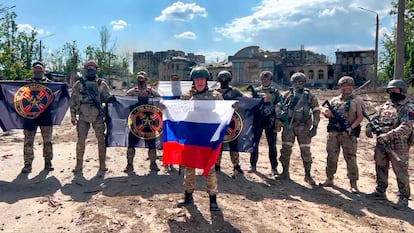Prigozhin, Putin’s former ally who conquered Bakhmut at the cost of thousands of his mercenaries
The Wagner company has played a decisive role in the war in Ukraine, where it has managed to maintain control of Russian positions in Donbas

Yevgeny Prigozhin and his mercenary group, Wagner, will be remembered in the troubled history of Vladimir Putin’s Russia for many crimes. Moscow’s destabilizing influence in Africa bears his name, with its armed support for governments such as Mali and the Central African Republic. But in the full-scale and bloodiest war the world has seen in decades — the Russian invasion of Ukraine — his role has been instrumental in maintaining control of Russian positions in the Donbas region.
Prigozhin, 62, had been one of Putin’s trusted men since his fledgling political career as an advisor to the St. Petersburg mayor in the 1990s, following the breakup of the Soviet Union. Under the protection of Putin’s state, which was eager to recover Russian imperial influence, Prigozhin created a company of mercenaries that did the Kremlin’s dirty work in places where it could not officially have a presence. But with the invasion of Ukraine, Wagner burst openly onto the international stage as a private arm of Russian power. The paramilitaries would become the cannon fodder for the longest and bloodiest Russian offensive: the battle for control of the city of Bakhmut, in the province of Donetsk.
The Russian takeover of Bakhmut, today a devastated and empty town, began in the summer of 2022 and ended in the spring of 2023. The Russian shock troops were Wagner’s men. Most of them — some 30,000 men convicted by the courts — were hired in prisons in exchange for reduced sentences. And most died in combat, according to NATO intelligence services.
The key to Wagner’s success in Bakhmut was simple, as explained by Prigozhin himself and confirmed by the Ukrainian military in this part of the front: there was no option to back down. Deserting an assault against Ukrainian positions was punishable by execution. This was confirmed by videos made public by the Ukrainian armed forces, and also by the Wagner company itself. The mercenaries exhausted the Ukrainian defenses, but paid for it with their lives. After them, the assault troops of the Russian professional army arrived to finish the job.
Prigozhin achieved results at the cost of thousands of deaths and, as he racked up victories, he became vocal about his dissatisfaction with the Russian command of the war, specifically, with Minister of Defense Sergei Shoigu. In the most decisive moments of the defense of the conquered territory in the province of Donetsk (Donbas), Prigozhin published messages criticizing Shoigu for his lack of support for Wagner, accusing him of wanting to reduce the supply of weapons to his mercenaries and underestimating their importance in the invasion of Ukraine.
Prigozhin’s bravado during the war in Ukraine — such as his visits to points on the front lines that Putin’s top military leaders did not dare to set foot on — were celebrated by his followers. His critical messages against the army top brass continued to escalate, until his coup attempt last June. Two weeks before he launched his attempted military assault on Moscow, EL PAÍS learned of an attempt by the Ukrainian Security Services (SSU) to obtain compromising information about Putin from Prigozhin. The operation did not amount to anything, but served as further proof of the distance between the president and his former friend and ally.
After the threat of a military uprising last June and Moscow’s attempts to bring the Wagner mercenaries under the control of the regular Russian Army, Prigozhin’s whereabouts remained a mystery. Belarus, a country subject to Russia, was to be his theoretical exile. The deployment of Wagner’s mercenary forces in the vicinity of the borders of Poland and the Baltic countries set off alarm bells in NATO. Prigozhin’s last public appearance was in a video recorded from Africa in which he said that Wagner would continue working to recruit mercenaries to fight for the freedom of the continent, that is, against any European and U.S. political influence.
The fate of Prigozhin and Wagner, which had grown powerful in Africa and in Ukraine, hung by a thread. A thread that snapped on Wednesday when the plane in which he was traveling crashed in Russia.
Sign up for our weekly newsletter to get more English-language news coverage from EL PAÍS USA Edition
Tu suscripción se está usando en otro dispositivo
¿Quieres añadir otro usuario a tu suscripción?
Si continúas leyendo en este dispositivo, no se podrá leer en el otro.
FlechaTu suscripción se está usando en otro dispositivo y solo puedes acceder a EL PAÍS desde un dispositivo a la vez.
Si quieres compartir tu cuenta, cambia tu suscripción a la modalidad Premium, así podrás añadir otro usuario. Cada uno accederá con su propia cuenta de email, lo que os permitirá personalizar vuestra experiencia en EL PAÍS.
¿Tienes una suscripción de empresa? Accede aquí para contratar más cuentas.
En el caso de no saber quién está usando tu cuenta, te recomendamos cambiar tu contraseña aquí.
Si decides continuar compartiendo tu cuenta, este mensaje se mostrará en tu dispositivo y en el de la otra persona que está usando tu cuenta de forma indefinida, afectando a tu experiencia de lectura. Puedes consultar aquí los términos y condiciones de la suscripción digital.









































